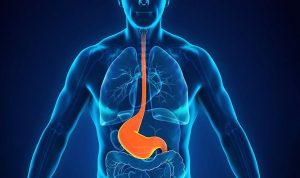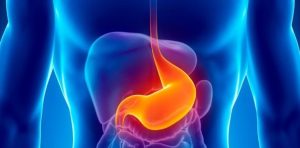Definition
Infant reflux occurs when the stomach contents of a baby move upward into the food pipe or mouth, which can cause regurgitation.
This condition is known as gastroesophageal reflux, shortly GER. It usually happens during or shortly after feeding and is quite common in babies.
It is estimated that about half of all infants spit up many times a day, especially in the first 3 months of their lives [1, 2, 3].
Reflux gets less common as a baby gets older and usually resolves on its own by the time a baby is 18 months old.
Medical professionals indicate that as long as your baby is healthy, happy and growing well, reflux is not a cause for concern [4, 5].
However, sometimes, reflux can bring about some troublesome symptoms and signs in a baby including; frequent vomiting, irritability, arching of the back, refusing to eat and thus poor weight gain [4, 6].
These symptoms may indicate, GERD, gastroesophageal reflux disease, which is a severe and frequent form of GER.
Difference Between Acid Reflux and Infant Reflux
Acid reflux is a common condition affecting numerous people around the world [7, 8, 9].
The condition (acid reflux) occurs when the stomach acid travels up into the esophagus (food pipe).
At the lower end of the esophagus there is a ring-like muscle known as the lower oesophagal sphincter (LES).
LES opens to allow foods or liquid to enter the stomach and then closes again to prevent stomach contents from moving upward.
When LES doesn’t close properly or relaxes when it shouldn’t, the stomach acid can come back up into the esophagus, causing some symptoms such as heartburn or sore throat.
As they have an immature digestive system, babies may have more reflux episodes compared to adults. Nevertheless, unlike adults, acid reflux in babies usually doesn’t cause sore throat or heartburn.
This is because it is unusual for the stomach contents of babies to have enough acid to irritate the throat, says Mayo Clinic.
GERD Symptoms in Babies
Although rare, reflux can cause some worrisome symptoms in some babies.
According to the National Institute of Diabetes and Digestive and Kidney Diseases; Infants with GERD may show some of the symptoms below:
- Loss of appetite
- Refusing to eat
- Poor weight gain
- Cough
- Irritability
- Problems with swallowing
- Chocking
- Gagging
- Wheezing
- Arching of the back
- Vomiting ( forceful and stronger than regurgitating )
Note: If you suspect your little one may have GERD, talk to your baby’s doctor.
Possible Causes of Baby Reflux
Reminder: The LES muscle is a barrier between the esophagus and stomach which keeps stomach contents where they belong.
The following are some potential causes of GER (Gastroesophageal reflux) in babies;
- Underdeveloped LES: The LES muscle in infants usually is not fully developed, therefore, stomach content can easily move upwards [10, 11].
- Short or narrow esophagus: Some infants may have a short or narrow esophagus. A narrow or short esophagus may cause the acidic contents to escape from the stomach into the mouth more easily.
- Lying down: Especially in the first 6 months, infants spend too much time lying down; so gravity doesn’t help keep stomach content in the stomach.
- Liquid diet: Most infants are fed an almost completely liquid diet. Liquid can escape upward easier than solid foods.
- Being born prematurely: Infant reflux is especially common in those born prematurely [12, 13].
Mistakes Leading to Infant Reflux
Sometimes, mistakes made by parents can also trigger reflux in infants.
The list below includes some of them:
- Feeding a baby just before bedtime
- Lying down a baby immediately after feeding
- Not burping a baby after feeding
- Overfeeding a baby
- Feeding a baby in a horizontal position
Note: Sometimes infants may experience reflux without bringing up milk or formula. This is called silent reflux [5, 14].
How to Minimise Infant Reflux
The below-given tips may help minimise the frequency as well as the severity of your little one’s reflux.
- Feed your baby in an upright position.
- Hold your baby upright at least 30 minutes after feeding.
- Burp your baby when feeding is over.
- Talk to your baby’s doctor to determine the ideal sleep position for your baby.
- Don’t feed your baby right before he/she sleeps
- Give your baby shorter but more frequent feeds.
- Make sure your baby’s clothes and diaper aren’t too tight because it may increase the pressure on the abdomen.
- If your baby is fed with a formula, ask your baby’s doctor to switch the formula. Do not change the formula on your own. Always work with your doctor!
- If you are a breastfeeding mother, avoid eating foods that can cause acid reflux because it may also trigger reflux in your breastfed baby.
Summary
As mentioned repeatedly, in most cases bringing up some milk or spitting up the formula a couple of times a day is normal for infants, especially for those who are under 1 year old. This is a condition known as baby reflux.
As long as, your baby looks content and happy during and after feeding, there is nothing to worry about.
However, in some cases, reflux (which may contain stomach acid) may irritate your baby’s esophagus and thus cause some symptoms that we mentioned above.
If you notice GERD symptoms in your baby, work closely with your baby’s doctor to soothe his/her symptoms.
Moreover, if your baby still spits up food or liquid after your baby is older than 18 months, see your doctor, the issue might be related to GERD or other medical conditions.
To raise a healthy and happy child, always follow your doctor’s recommendations and stick to the treatment plan your doctor determines.
Tarkan is an experienced health writer ( currently more than 600 articles ) and also the founder of this website namely www.neededforhealth.com. His expertise in health stems from in-depth medical research and knowledge which he obtained over the course of many years.
Tarkan enjoys sharing factual knowledge on health, psychology and nutrition. He always aims to deliver evidence-based recommendations, provide links to related scientific studies.





